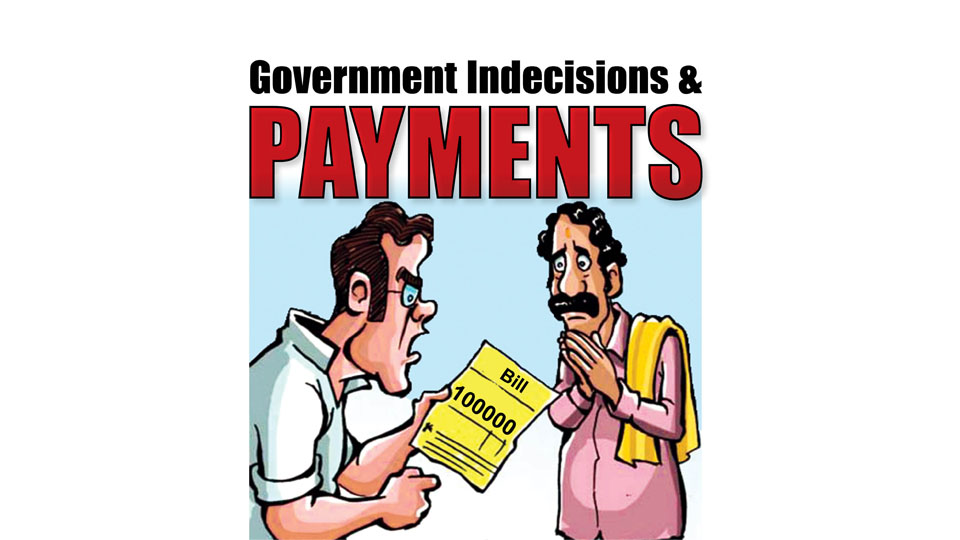
This morning, ‘The Hindu’ newspaper reported that the Government owes the Radisson Blu Plaza Hotel in Mysuru Rs. 80 lakh in pending bills. The confusion is: Which Government will foot the bill — the Centre or the State?
We are sure the hotel will get its money eventually, but when? It’s already been one year.
Our Governments, both State and Central, have always been bad paymasters.
Governments are good at collecting payments but terrible at making them, especially after using the services of private establishments.
In 2015, in a television interview, former Infosys Chairman N.R. Narayana Murthy said there was not a single Government project where his company had not lost money!
In 2023, the Karnataka State Contractors Association President Kempanna told news persons that thousands of contractors have been awaiting bills totalling up to Rs. 22,000 crore, pending for the last four years!
As reports of contractors committing suicide came to light, in 2024, the Karnataka Government released Rs. 800 crore, just about 4 percent of the total due.
The same was true with the Yeshasvini Health Insurance Scheme. The Government did not pay the private hospitals, and soon, many private hospitals started avoiding patients who came under the Yeshasvini scheme.
Similar was the reason with Indira Canteen. The contractor was starving for payments while the public was eating and voting. Soon, many canteens shut down.
It is well-known that Governments don’t pay well, and what’s worse is when they are indecisive. This reminds one of the ‘Ink saga.’
Who uses what ink?
In his book ‘Governance’, senior journalist Arun Shourie recalls how the Government took one year to decide what colour ink Government officers should use.
In early 1999, two officers in the Ministry of Steel made notes on some files. Their superiors, apart from the content in the files, also noticed that they had used two colours — red and green ink.
The superiors wondered if this was allowed and wrote to the Department of Administrative Reforms and Public Grievances: “Can officers use inks other than blue or black?”
The Department decided that since the matter concerned ink, the Directorate of Printing must be consulted.
The Directorate of Printing replied, “There are no guidelines in respect of the use of different colours of ink.” And added, “The Department of Personnel and Training be consulted.”
The Department of Personnel and Training wrote back, “The question is up to the Department of Administrative Reforms and Public Grievances.” They threw the ball right back to square one!
Later, an officer in the Department of Personnel and Administrative Reforms proposed that the matter be judged in terms of the longevity of the file notings as some files are kept permanently.
This meant that the issue now moved to which ink lasted longer!
So, a letter was sent to the Director General, National Archives of India!
The Deputy Director of the National Archives replied, “If fountain pen ink is used, the prescribed colour is blue/ black. For ballpoint ink, the colours are blue, black, red, and green.”
This led to more confusion: What type of pen must an officer use?
It was decided to refer to the instructions contained in the relevant manual for the Armed Forces.
Soon a letter was dashed off to the Defence Ministry.
The Ministry of Defence replied, “Red ink is used by the Chief of Army Staff/ Naval Staff/ Air Staff. Principal Staff Officers use green ink, and all other officers use blue or black ink.”
Finally, a year later, two additions were made to the Manual of Office Procedure: Black or blue ink will be used by all staff and officers. Only the Joint Secretary and above may use green, or red ink in rare cases. But what is a ‘rare case’?
In the end, ambiguity remains even after so much deliberation and involvement of five Government Departments.
The ink saga may have ended in ambiguity. Luckily, it didn’t go to Court. Government Departments, both in the Central and State Governments, are the biggest litigants in our High Courts and the Supreme Court.
Approximately 46 percent of pending cases before the Courts pertain to the Government.
The 230th Law Commission report on reforms in the judiciary (2009) significantly and clearly states that the responsibility of unclogging the judiciary was with the Central and State Governments because they are the biggest litigants in the Courts of India!
The report noted that Governments are approaching the Courts just to pass the buck.
Let’s hope Radisson Hotel’s payment issue doesn’t get tossed around or, worse, goes to the Court. Else, other star hotels in Mysuru will think twice before giving their rooms to any Government event.
e-mail: [email protected]








Recent Comments